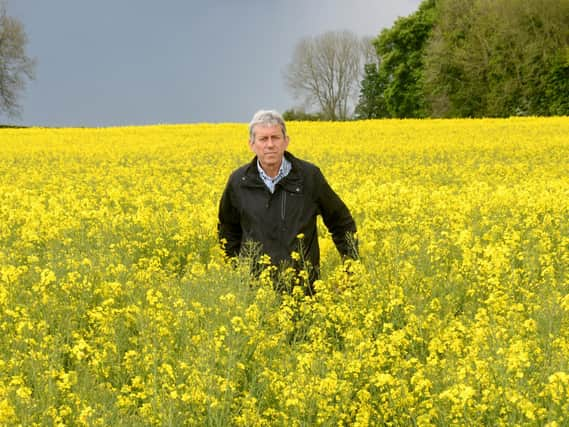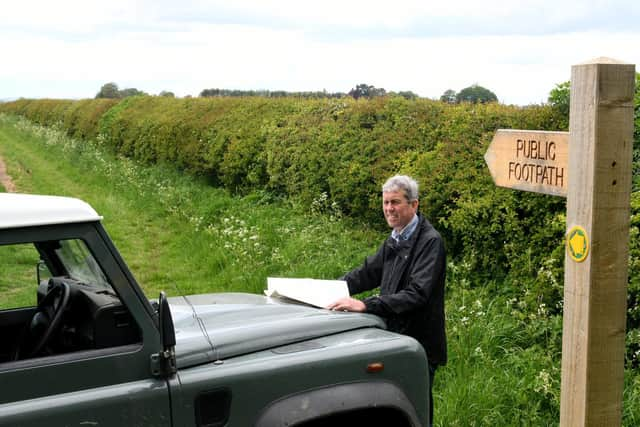Farm of the Week: Wagyu beef, sprout growing and Driffield Show organisation in the Wolds


Surveying footpaths for his son James, son-in-law Sam and nephews Tom and Kieran as they walk the 79 miles of ‘Wolds Way in a Day’ in aid of Prostate Cancer UK; dealing with crops due to the vagaries of the weather and blackgrass; changing his beef enterprise to Wagyu and charting the return of Driffield Show have all involved key decisions.
Mark farms 725 acres at Cawkeld and 100 acres at Bugthorpe and is growing 400 acres of winter wheat this year. Almost half is grown for seed with the rest as feed wheat. Other crops are oilseed rape, peas, potatoes and sprouts.
Advertisement
Hide AdAdvertisement
Hide AdThe scourge of many arable farmers over the past decade and more has been blackgrass. Mark said he had adopted a zero-tolerance policy to it through his father Brent, who sadly passed away earlier this week.


“My dad had exceptionally high standards and I like to think I’ve followed suit. When people ask what the secret is to getting rid of blackgrass, I say you have to hate it so much that when you are field walking or on the sprayer and you see a single plant you should stop and pull it out by hand.
“It is the only way to get total control. We walk a lot to try to keep free from blackgrass. If there are thousands of plants you need chemicals, but that effort to pull out one plant is well worth it.”
Mark said his crop rotation is two wheats and oilseed rape, followed by two wheats and a vegetable crop. He said achieving the wheat yield he’s looking for proved challenging last year.
Advertisement
Hide AdAdvertisement
Hide Ad“We generally grow wheat and oilseed rape well. Our sensible aim on yield is four tonnes per acre on wheat. We will achieve that in a decent year.
“Our wheat varieties this year are Wolverine and Gleam for seed and Gravity for the feed wheat. Wolverine is yellow dwarf virus resistant, which can be an issue certain years.
“We all have ups and downs as farmers. The weather is what is always talked about, but everything has advantages and disadvantages. Currently, it’s the bad weather elsewhere in the world that has seen our wheat price at around £200 per tonne.”
In order to spread his rotation and keen to maintain his oilseed rape yield, Mark said he had added sprouts to help.
Advertisement
Hide AdAdvertisement
Hide Ad“I believe we get decent yields of oilseed rape because when we started with it in the late 1980s we hadn’t grown it for a long while. A few years ago I just felt it was time to put in another crop as the rape yield may have otherwise started to diminish.
“I approached ‘the sprout man’ John Clappison to start growing for him. Sprouts are a highly specialised crop, which he looks after completely apart from any irrigation necessary. I look after that if the crop is looking a bit dry.”
Cawkeld also has a lake that Mark said provides sufficient irrigation for his crops, as well as being a feature of the house and lawned garden.
Precision farming through autosteer on the tractors, yield monitoring on the combine harvester and variable seed rate application based on soil type on the drill are all components that Mark said are proving essential at Cawkeld, but not just in terms of economy.
Advertisement
Hide AdAdvertisement
Hide Ad“Satellite technology is a big thing for us. This isn’t a massive farm and I don’t have a bottomless wallet but one of the things I have realised is that without the technology you don’t attract the right people to work for you.
“My farm manager, Charlie, is a young guy who loves farming, especially with the right equipment for today’s farming world and I always have a student on the farm.
Mark’s latest move on the farm has been a changeover from fattening continental crossbred cattle to Wagyu from Warrendale Wagyu. Mark said he’d been monitoring the progress of the breed.
“Shifting to Wagyu had been on my radar for a while and around 18 months ago I made the switch. I have 87 Wagyu and once we start finishing them I intend to have 100 at any one time.
Advertisement
Hide AdAdvertisement
Hide Ad“The beef cattle I had previously would be fattened and away by 18 months but the value of the meat from Wagyu cattle means we will be taking them to between 28-36 months.”
The Wagyu also provide another benefit while grazing that Mark says he finds particularly appealing.
“We have a lot of footpaths and through the pandemic they have been really busy. Wagyu cattle are a lot better with walkers than the continentals. They are friendly and gentle animals.”
Mark and his wife Diane have lived at Cawkeld for 25 years having started their married life at Bugthorpe. They have a daughter, Charlotte, who is married to Sam Atkinson who builds straw-walled houses and the couple have a one-year old son, William. Son James marries in July, but his and Mark’s focus is presently on the charity walk.
Advertisement
Hide AdAdvertisement
Hide Ad“James’ grandpa Dick Watson has proved James’ and his cousins’ inspiration. Dick has been treated for prostate cancer and the boys wanted to do something about it. I’m in the support party.
Mark is also heavily involved in the return of Driffield Show, reputed to be the country’s largest one-day show. It is to be held over two days for the first time on July 21-22.
“This is my second year as chairman but my first with an actual show. It’s certainly going to be different. We are limited to 10,000 paid visitors each day and tickets are selling very well.
“We will definitely have our Grand Parade and we already have our great mix of trade stands booked. We are all excited to be back.”
If you would like to donate to the ‘Wolds Way In a Day’ fundraiser visit: https://justgiving.com/fundraising/woldsway